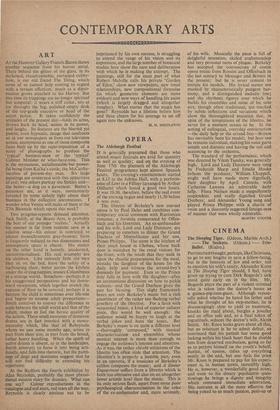OPERA
The Aldeburgh Festival IT is generally presumed that those who attend music festivals are avid for quantity as well as quality; and on the evening of June 17th the planners of the Aldeburgh Festival programmes kept almost Spanish hours. The evening's entertainment started at 8.15 in the Jubilee Hall, with a perform- ance of Love in a Village (arranged by Arthur Oldham) which lasted a good two hours. It was 10.30, therefore, before the real event of the evening began and nearly 11.30 before it was over.
The libretto of Berkeley's new one-act opera is by Paul Dehn and combines con- temporary social comment with Ruritanian romance, a formula consecrated by Offen- bach and his librettists. An ex-ambassador and his wife, Lord and Lady Dunmow, are preparing to entertain to dinner the Grand Duchess of Monteblanco and her son, Prince Philippe. The scene is the kitchen of their small house in Chelsea, whose back door is mistaken by the royal visitors for the front, with the result that they walk in upon the chaotic preparations for the meal, mistake the daughter of the house for the daily help and witness the errand-boy's demands for payment. Even so the Prince duly falls in love with the daughter—after an acrimonious discussion on how to pickle walnuts—and the Grand Duchess gives the pair her blessing. This slight framework bears not only Berkeley's music but a rich assortment of the rather too flashing verbal jewellery of the librettist. For a farce with occasional music, a kind of superior cabaret piece, this would be well enough: the audience would be happy to laugh at the verbal jokes and hum the tunes. But Berkeley's music is on quite a different level —thoroughly 'composed,' with musical characterisation and ensembles whose musical interest is more than enough to engage the audience's interest and attention. As it was, the rather chi-chl witticisms of the libretto too often stole that attention. The librettist's is properly a humble part, even in an operetta, if a musician of Berkeley's calibre composes the music; and A Dinner Engagement suffers from a libretto which is both too obtrusive and also on an altogether lower artistic level than the music. This is its only serious fault, apart from some poor psychological characterisation in the roles of the ex-ambassador and, more seriously, of his wife. Musically the piece is full of delightful invention, skilled craftsmanship and very personal turns of phrase. Berkeley has accepted the conventions of comic opera music from Rossini and Offenbach in the last century to Messager and Britten in the present; but he is never content to imitate his models. His lyrical scenes are marked by characteristically pungent har- mony, and a distinguished melodic line; and the rhythmic figures over which he builds his ensembles and some of his solo airs, though often traditional, are marked by subtle inflections and variations which show the thoroughbred musician that, in spite of, the temptations of the libretto, he never for a moment ceases to be. In the setting of colloquial, everyday conversation —the daily help or the errand boy—Britten has inevitably been his model; but here too he remains individual, making his voice parts • simple and diatonic and leaving the salt and seasoning to the orchestra.
The standard of the performance, which was directed by Vilem Tausky, was generally high. Lord and Lady Dunmow were sung by Frederick Sharp and Emelie Hooka (whom the producer, William Chappell, might well -have made more dignified), their daughter by April Cantelo, with Catherine Lawson an admirable daily help. Flora Nielsen made a magnificently resplendent. and really dignified Grand Duchess; and Alexander Young sang and played Prince Philippe with a charm of voice and a discreetly suggested foreign-ness of manner that were wholly admirable.


































 Previous page
Previous page